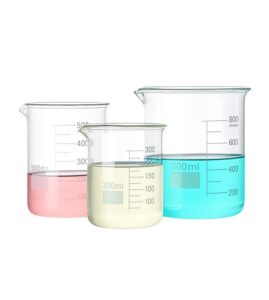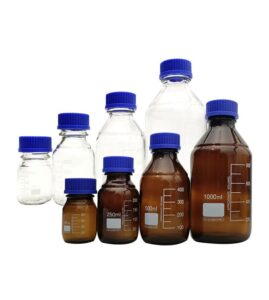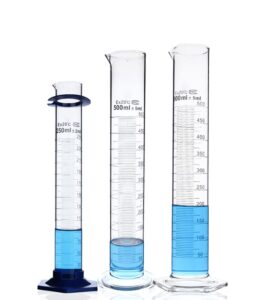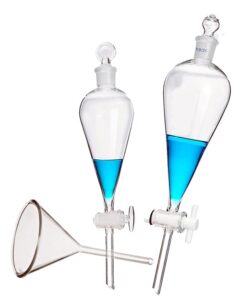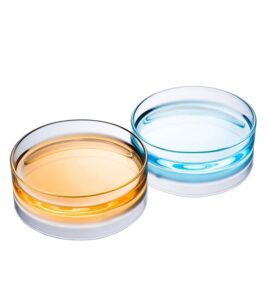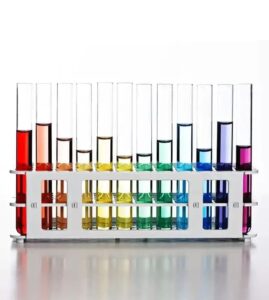Have you ever wondered about the safest way to handle laboratory glassware? Does the thought of dealing with fragile, potentially hazardous materials in a lab setting make you nervous? You’re not alone. Many professionals and students alike grapple with these concerns daily.
Ensuring safety in a laboratory starts with proper handling and care of glassware. This guide aims to provide essential tips for maximizing safety with laboratory glassware. By following these best practices, you can significantly reduce the risk of accidents and maintain a safe laboratory environment.
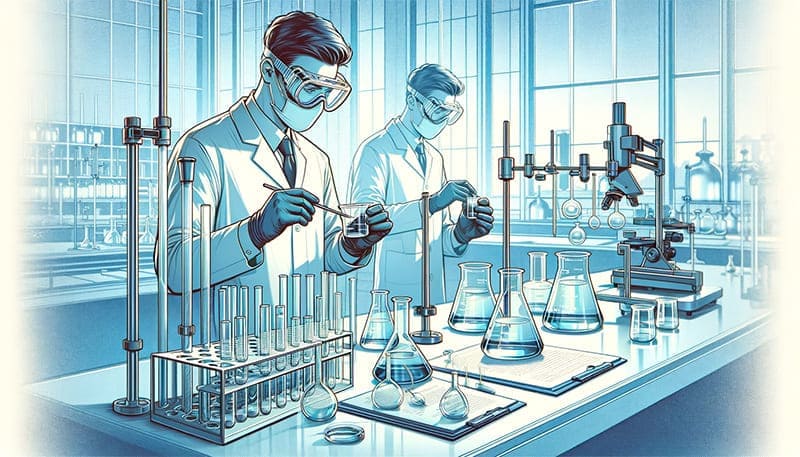
Why is Glassware Safety Crucial in Laboratories?
Laboratory glassware, such as beakers, flasks, and test tubes, is fundamental to scientific research. However, improper handling can lead to breakages, chemical spills, and even injuries. Understanding the do’s and don’ts of glassware safety is key to preventing such incidents.
Key Practices for Safe Handling of Laboratory Glassware
- Examine Glassware Before Use: Always inspect glassware for any signs of damage like chips, cracks, or cloudiness. Using damaged glassware can lead to breakages, especially under heat or pressure.
- Proper Cleaning: Soak glassware immediately after use to prevent chemical residues from hardening. Avoid using wire brushes which can scratch and weaken the glass.
- Appropriate Heating: Use hot plates that match the size of the beaker or flask. Uneven heating can cause stress and breakage in glassware.
- Gradual Temperature Changes: Sudden temperature shifts can crack glassware. Always heat and cool glassware slowly to prevent thermal stress.
- Use PTFE-Coated Stir Bars: Ensure stir bars are coated with polytetrafluoroethylene (PTFE) to prevent glassware damage during stirring.
- Proper Storage: Cushion glassware with soft materials like paper towels when storing in drawers to prevent scratches and breakages.
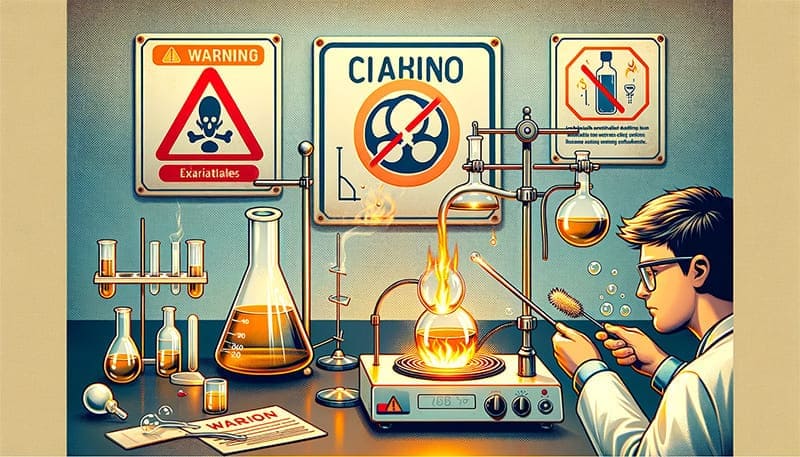
Practices to Avoid with Laboratory Glassware
- Do Not Heat Certain Glassware: Avoid heating glass bottles, jars, or dishes as they are not designed to withstand direct heat.
- Avoid Applying Vacuum to Square Bottles: Square bottles are not designed to handle vacuum pressure and can implode.
- Uneven Heating and Cooling: Do not heat glassware unevenly or rapidly. This can cause thermal stress and breakage.
- Avoid Using Damaged Glassware: Never use glassware that is chipped, scratched, bruised, or cloudy. Even minor damage can lead to breakages under stress.
Enhancing Laboratory Efficiency and Safety
Beyond basic safety, efficient use of glassware is vital for smooth laboratory operations. Proper organization and maintenance of glassware can save time and reduce the risk of accidents. Here are some additional tips:
- Organization is Key: Keep glassware organized and easily accessible. This reduces the time spent searching for the right piece and minimizes handling, thereby reducing the risk of breakage.
- Regular Inventory Checks: Conduct regular checks of your glassware inventory. This helps in identifying and replacing damaged or missing pieces promptly.
- Training and Awareness: Ensure that all lab personnel are trained in glassware handling and safety protocols. Awareness is the first step towards prevention.
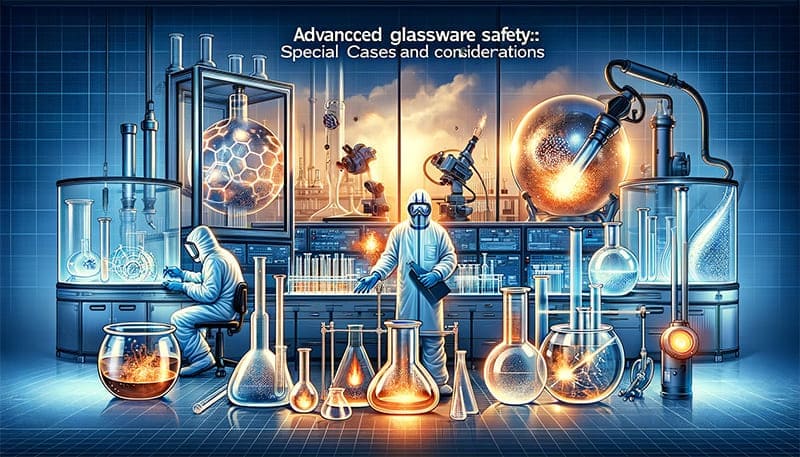
Advanced Glassware Safety: Special Cases and Considerations
In some scenarios, special considerations are necessary:
- Handling Hazardous Chemicals: When dealing with hazardous chemicals, use borosilicate glassware, known for its thermal and chemical resistance.
- Pressure and Vacuum Applications: For experiments involving pressure or vacuum, use specially designed glassware to withstand these conditions.
- Ultraviolet (UV) Light Exposure: If your experiment involves UV light, ensure that the glassware does not absorb UV rays, which could affect the results.
Navigating Challenges in Glassware Safety
Despite best practices, challenges can arise. Here’s how to address some common issues:
- Space Limitations: In small labs, storing and organizing glassware can be challenging. Utilize vertical space with shelves and racks designed for glassware.
- Budget Constraints: High-quality glassware can be expensive. However, investing in durable, high-quality pieces can be more cost-effective in the long run due to their longevity and reliability.
- Evolving Safety Standards: Stay updated with the latest safety standards and protocols. Regular training sessions can help keep lab personnel informed.
Final Thoughts: The Role of Culture in Laboratory Safety
Ultimately, the safety and efficiency of a laboratory hinge on its culture. A culture that prioritizes safety, organization, and continuous learning can significantly reduce accidents and enhance productivity. Encourage open communication about safety concerns and continuously seek ways to improve safety protocols.
By incorporating these practices into your daily routine, you can contribute to a safer, more efficient laboratory environment. Remember, safety in the lab is a collective responsibility!
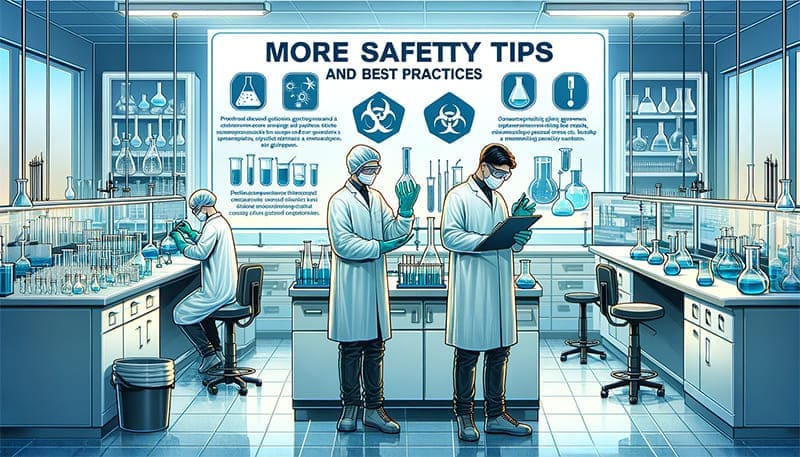
More Safety Tips and Best Practices
- Always wear appropriate protective gear, such as gloves and safety goggles, when handling glassware.
- Be aware of the chemical compatibility of glassware with the substances you are using.
- Properly dispose of broken glassware in designated containers, not in regular trash bins.
Fostering a Proactive Safety Mindset in the Lab
A proactive approach to safety goes a long way in preventing accidents. Encourage lab members to actively think about potential hazards and how to mitigate them. This could include:
- Regular Safety Meetings: Hold regular meetings to discuss safety issues, share experiences, and update on new protocols.
- Encourage Reporting: Create an environment where lab members feel comfortable reporting safety concerns and near-misses.
- Continuous Education: Keep up with the latest safety trends and research. Encourage lab members to participate in workshops and webinars.
Incorporating Technology for Enhanced Safety
Leveraging technology can significantly improve safety in the laboratory:
- Automated Safety Systems: Consider installing systems that automatically shut off equipment in case of a hazard.
- Use of Digital Inventory: Digital tracking of glassware and chemicals can prevent misuse and improve organization.
- Online Safety Training Modules: Utilize online resources for ongoing safety training, which can be more flexible and accessible.
The Impact of Glassware Safety on Research Quality
Safe handling of glassware isn’t just about preventing accidents; it’s also crucial for the integrity of scientific research. Contamination or damage to glassware can compromise experiment results, leading to inaccurate data.
- Regular Calibration and Maintenance: Ensure that all measuring glassware is regularly calibrated and maintained.
- Document Handling Procedures: Keep a record of glassware handling procedures to maintain consistency in experiments.
- Quality Control Checks: Implement quality control checks to ensure that glassware cleanliness and integrity are maintained.
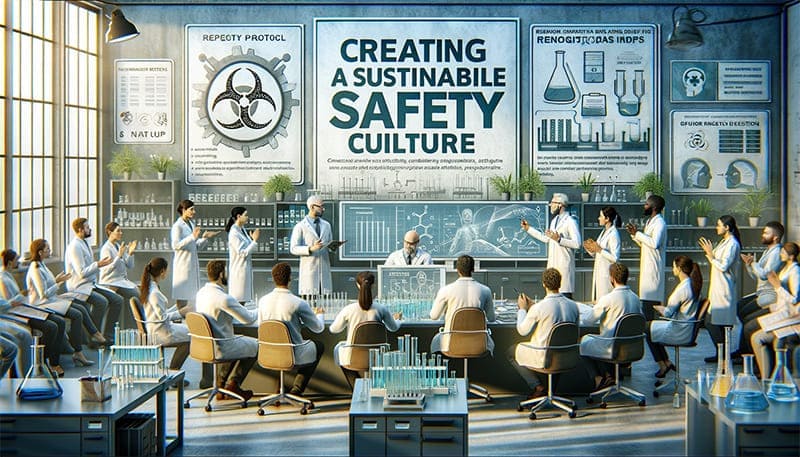
Creating a Sustainable Safety Culture
Developing a sustainable safety culture is key to long-term safety in the lab. This involves:
- Lead by Example: Senior lab members and supervisors should model safe behavior at all times.
- Sustainability Practices: Incorporate eco-friendly practices in glassware handling and disposal to promote environmental responsibility.
- Reward Safe Practices: Acknowledge and reward lab members who consistently adhere to safety protocols.
Safety as a Continuous Journey
Laboratory safety, especially with glassware, is not a one-time effort but a continuous journey. Regularly revisiting and updating safety practices, embracing new technologies, and fostering a culture of safety and learning are essential for a safe and productive lab environment.
Remember, every small step towards safety can make a significant difference in ensuring a secure and efficient laboratory.
Conclusion
Adhering to these safety practices not only ensures your well-being but also contributes to the success of your experiments. Remember, safety in the lab starts with you!


